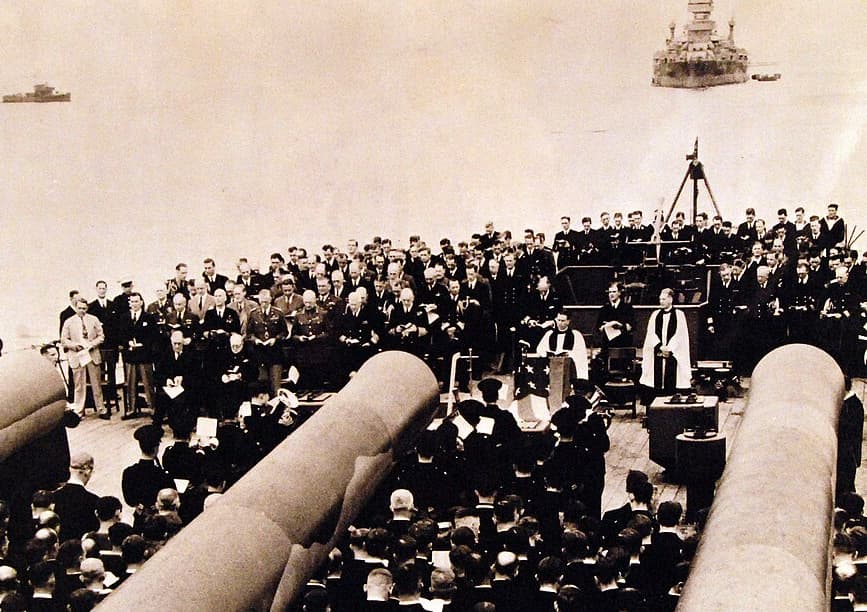Poem of the Day: ‘Eternal Father, strong to save’
Often called ‘The Navy Hymn,’ or ‘The Royal Navy Hymn,’ the lyrics are as fine a trinitarian hymn as the tradition has produced.

We conclude our week of thinking about the poetry of the English-language hymn tradition with what’s often called “The Navy Hymn,” or “The Royal Navy Hymn,” or just by its first line, “Eternal Father, strong to save.” The lyrics are as fine a trinitarian hymn as the tradition has produced.
The lyricist, the Reverend William Whiting (1825–1878) was master of choristers at the Winchester boarding school, and his literary output seems to promise little. He apparently published two volumes of poetry, “Rural Thoughts” in 1851 and “Edgar Thorpe, or the Warfare of Life” in 1867.
The only review I could find of the later was in a journal called Monthly Packet of Evening Readings for Members of the English Church, and even in that narrowly focused publication, the review read in its entirety: “The Rev. W. Whiting’s Edgar Thorpe is a well-intentioned blank-verse history of a respectable and well-educated youth,” with “well-intentioned” not the adjective for which a poet hopes. Interested readers can find a brief extract from the poem in the 1868 Penny Post, under the title “The Village Schoolmaster.”
In 1860, however, he wrote some lyrics intended to assuage the fears of a student facing a sea-voyage to America. Within a year a revised version had appeared in “Hymns Ancient and Modern,” a key collection in the Victorian systematizing of hymnody, intended to stand beside “The Book of Common Prayer” as a standard Anglican document. The hymnbook’s originally assigned melody was replaced with a tune specifically written for Whiting’s words by the Rev. John Bacchus Dykes (1823–1876) — and it is to this tune that “Eternal Father, strong to save” is now always sung.
The trinitarian narrative of the hymn begisn with the first verse, which looks to God the Father, “Whose arm doth bind the restless wave, / Who bid’st the mighty ocean deep / Its own appointed limits keep.” (The reference is to Psalm 107, with its promise that Noah’s Flood would not be repeated.) The recurring last lines of the tetrameter verses — “O hear us when we cry to Thee / For those in peril on the sea” — hark back to 2 Corinthians 11:26.
The second verse gathers mentions of the sea in the gospels, calling on the Second Person of the Trinity. The first lines look to Christ’s stilling of the storm that threatened the boat of the disciples (in Luke 8.22-25, for example), while the next lines turn to Christ’s walking on the water (in Matthew 14:22-33): “And when the disciples saw him walking on the sea, they were troubled, saying, It is a spirit; and they cried out for fear. But straightway Jesus spake unto them, saying, Be of good cheer; it is I; be not afraid.”
The third verse then takes up the Holy Spirit, which broods upon the water at the moment of creation in Genesis 1:2, while the final verse explicitly names the Trinity, and looks to perhaps the central mention of the sea in the Bible — Psalm 107, with its sense that the grandeur of God is clear in the ocean’s wild water: “They that go down to the sea in ships, that do business in great waters, / These see the works of the Lord, and his wonders in the deep.”
Eternal Father, strong to save
by William Whiting
Eternal Father, strong to save,
Whose arm doth bind the restless wave,
Who bid’st the mighty ocean deep
Its own appointed limits keep;
O hear us when we cry to Thee
For those in peril on the sea.
O Savior, whose almighty word
The winds and waves submissive heard,
Who walkedst upon the foaming deep,
And calm amid the rage didst sleep;
O hear us when we cry to Thee
For those in peril on the sea.
O Holy Spirit, who didst brood
Upon the waters dark and rude,
And bid their angry tumult cease,
And give for wild confusion peace;
O hear us when we cry to Thee
For those in peril on the sea.
O Trinity of love and pow’r,
Your children shield in danger’s hour;
From rock and tempest, fire, and foe,
Protect them wheresoe’er they go;
Thus, evermore shall rise to Thee
Glad hymns of praise from land and sea.
___________________________________________
With “Poem of the Day,” The New York Sun offers a daily portion of verse selected by Joseph Bottum with the help of the North Carolina poet Sally Thomas, the Sun’s associate poetry editor. Tied to the day, or the season, or just individual taste, the poems are drawn from the deep traditions of English verse: the great work of the past and the living poets who keep those traditions alive. The goal is always to show that poetry can still serve as a delight to the ear, an instruction to the mind, and a tonic for the soul.
